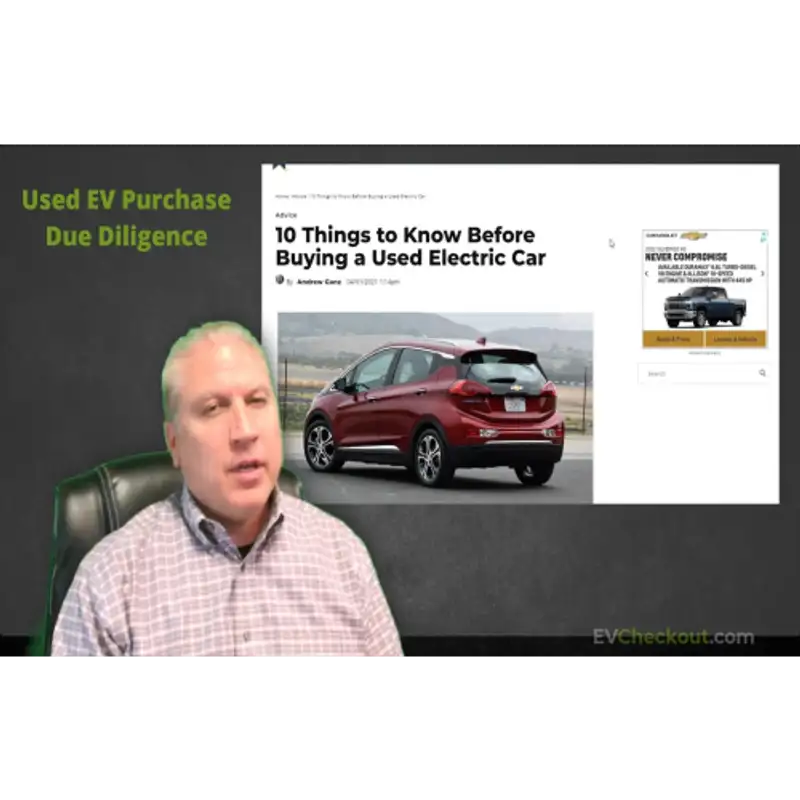Give me the best Episode Podcast Title:
Download MP3Right now, if you're looking to buy a used vehicle, 90-something percent of the used cars that you will find, whether it's a dealership or a private sale, will be an internal combustion engine. Used electric vehicles (EVs) are not yet ubiquitous on dealers' lots, and that's because the high volume of electric vehicle production really only started a few years ago. So, there aren't many in the used car market. You have to look back on the used car lot many years, and you can find cars that are eight, nine, or ten years old, but not many vehicles from that year model will be electric.
So, if you're looking to buy an electric vehicle, is it any different than buying an internal combustion engine? Well, there are a lot of differences, and we're going to take a look at a couple of the considerations that you need to take into account prior to purchasing a used electric vehicle. Number one is, how do you evaluate the condition of an electric vehicle? If you're considering a gas engine with a normal engine, transmission, and driveline, it's very easy to inspect the vehicle—check out things like fuel injectors, compression ratios, oil leaks, and transmission slippage. But on an electric vehicle, it does not have all those expensive components. It does have one very expensive component, and that is the battery. And that's one of the reasons why a battery condition check is one of the most important and highly suggested parts of evaluating an electric vehicle.
Here's an article from Kelly Blue Book, which is an authority on used car values, and this has 10 things to know before buying an electric car. Look at the first four or five: battery life as a bargaining chip, whether the battery has been replaced, investigate how much data the maintenance history has about the battery. That's because the battery on an electric vehicle, and the remaining life, is the key to determining the value. And the other even moving parts of the vehicle, the electric motors that drive the vehicle, are very resilient. It's not like an internal combustion engine with a lot of heat, friction, and wear items. A vehicle with an electric engine lasts a good bit longer than a combustion engine with oil and fuel, but the battery can go away quickly. That's something you want to evaluate.
Here is an article that talks about the best used electric cars, and we'll see how the battery relates to that subject. They talk about things like the Nissan Leaf, the Kia Niro, the Audi e-Tron, and in each case, it talks about one of the pros and cons. Is it affordable? Does it have a lot of range? The Nissan Leaf is best suited for drivers who don't plan to drive that far, and each one has pros and cons. A lot of this will depend upon how you're going to use the vehicle.
This is elegance and style. So, this is a luxury vehicle, Tesla. The most important thing is looking for a vehicle where you're not going to have to spend tens of thousands on a battery within a couple of years. The Kona EV, in our opinion, is one of the best-rated used vehicles. But in any case, whatever you pick, if the battery is no good, then you're going to be coming out of pocket tens of thousands or thousands of dollars in the near future.
What does the future hold for the EV market? Well, this may not seem like it has to do with electric vehicles, but there are 13 new battery factories coming on the market in the next few years. Those are mostly to build batteries for new vehicles. However, with more new electric vehicles on the market, the prices for used vehicles may come down, and there'll be more availability. In addition, some of these factories are going to produce replacement batteries for existing vehicles, for used vehicles. So, you may be able to replace your battery on a used vehicle easier than it is now. Keep in mind that replacing the battery is not simple plug and play. You have to do a lot of labor to take apart components that are outside of the battery and the electrical connections. It's a high-voltage device.
Last but not least, about used electric vehicle purchases, there are now several incentive and rebate programs for used electric vehicles based on different states. It ranges from $1,000 to $7,500, depending on eligibility. Some of the state's eligibility is based on low income, but either way, it provides financial assistance to cover down payments on new or used EVs, and maybe even paying for a charging station replacement of an older, high-polluting vehicle. In California, you have a consumer assistance program. In addition, many electric utility companies have rebates if you switch over to an electric vehicle or if you have a plug-in vehicle. There's a new car tax credit; however, there's also talk about adding a used vehicle rebate program to the federal guidelines. Check in your study, check with your dealer about what's available for used cars, because you may find that if you locate a good quality used electric vehicle with a good battery and you can get a rebate, that may be an excellent alternative to a new electric vehicle that could be twice as much money and not have anywhere near twice as much life left in it, like a used internal combustion engine. A used vehicle for two or three years might have used up half its useful life of wear and tear components.

